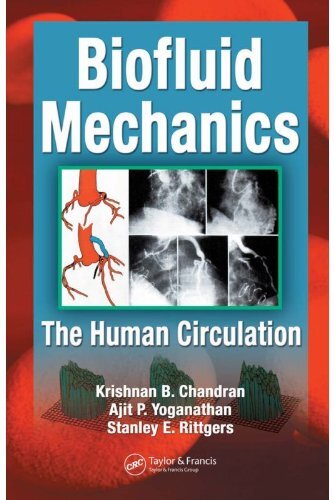
Biofluid Mechanics: The Human Circulation (English Edition)
- 作者
- Krishnan B. Chandran、Stanley E. Rittgers、Ajit P. Yoganathan
- 语言
- 英语
- 电子书格式
- epub,pdf,mobi,azw3,txt,fb2,djvu
- 下载次数
- 1545
- 更新日期
- 2023-07-31
- 运行环境
- PC/Windows/Linux/Mac/IOS/iPhone/iPad/iBooks/Kindle/Android/安卓/平板
内容简介
Part medicine, part biology, and part engineering, biomedicine and bioengineering are by their nature hybrid disciplines. To make these disciplines work, engineers need to speak "medicine," and clinicians and scientists need to speak "engineering." Building a bridge between these two worlds, Biofluid Mechanics: The Human Circulation integrates fluid and solid mechanics relationships and cardiovascular physiology.The book focuses on blood rheology, steady and unsteady flow models in the arterial circulation, and fluid mechanics through native heart valves. The authors delineate the relationship between fluid mechanics and the development of arterial diseases in the coronary, carotid, and ileo-femoral arteries. They go on to elucidate methods used to evaluate the design of circulatory implants such as artificial heart valves, stents, and vascular grafts. The book covers design requirements for the development of an ideal artificial valve, including a discussion of the currently available mechanical and bioprosthetic valves. It concludes with a detailed description of common fluid mechanical measurements used for diagnosing arterial and valvular diseases as well as research studies that examine the possible interactions between hemodynamics and arterial disease. Drawing on a wide range of material, the authors cover both theory and practical applications. The book breaks down fluid mechanics into key definitions and specific properties and then uses these pieces to construct a solid foundation for analyzing biofluid mechanics in both normal and diseased conditions.
Biofluid Mechanics: The Human Circulation (English Edition) EPUB, PDF, MOBI, AZW3, TXT, FB2, DjVu, Kindle电子书免费下载。
- 赛车与跑车图典 韩雪
- 时间序列分形方法在大气环境中的应用 史凯、刘春琼
- 玻璃化学 周艳艳、张希艳
- Vascular Access in Clinical Practice (English Edition) Scott Berman
- 麦肯锡零秒执行力(麦肯锡韩国分公司创始人首度分享,麦肯锡精英都在用的超高效行动法则,全面提升你的判断力和执行力!后浪出品) 赤羽雄二、侯昭康
- 畅游欧洲,看这本就够了 (畅游世界) 《畅游欧洲》编辑部
- Gene Patents and Collaborative Licensing Models: Patent Pools, Clearinghouses, Open Source Models and Liability Regimes (Cambridge Intellectual Property and Information Law Book 10) (English Edition) Geertrui van Overwalle
- 塑料改性实用技术 齐贵亮
- Oral Cavity Reconstruction (English Edition) Terry A. Day、Douglas A. Girod
- Concrete Masonry Designer's Handbook (English Edition) Anton Fried
- 液压传动与控制(第4版) 贾铭新
- 健康中国茶 王春玲
- Maynard Keynes: An Economist's Biography (English Edition) Donald Moggridge
- 水电工程砂石骨料生产技术 赵小青、王章忠、冯钧
- 道路运输车辆综合性能检验 陈成法
- 坚果炒货食品加工技术 (农副产品加工技术丛书·农村书屋系列) 章绍兵
- 看节气喝靓汤 夏季篇 林举择
- Sensors and Actuators: Control System Instrumentation (English Edition) Clarence W. de Silva
- 高级育婴师从入门到精通:彩色图解版 (就业金手指系列) 马水学、艾小雄
- Catalysis and Electrocatalysis at Nanoparticle Surfaces (English Edition) Andrzej Wieckowski、Elena R. Savinova、Constantinos G. Vayenas
- 预见未来:菲利普·迪克中短篇小说全集III(电影原著 豆瓣评分8.7 鬼才科幻大师 好莱坞灵感来源 科幻世界出品) (世界科幻大师丛书) 菲利普·迪克、郝秀玉
- 聚斯金德文集(套装共5册)【上海译文出品!20世纪德国传奇畅销作家,写尽时代的心灵困局!精美文集插图本,豆瓣读书高分推荐!】 帕·聚斯金德(Patrick Suskind)、李清华等
- Signal and Image Processing in Navigational Systems (Electrical Engineering & Applied Signal Processing Series Book 17) (English Edition) Vyacheslav Tuzlukov
- 防身格斗 (格斗图解系列) 《格斗图解系列》编写组
- 小学生快乐学汉字 王振刚
- Atlas of Human Blastocysts (Encyclopedia of Visual Medicine Series Book 59) (English Edition) Nikica Zaninovic MS
- 电气控制从入门到精通 刘振全、王汉芝
- 家电维修职业技能速成课堂·洗衣机 陈铁山
- Practical Analysis and Reconstruction of Shooting Incidents (Practical Aspects of Criminal and Forensic Investigations) (English Edition) Edward E. Hueske
- Conceptual Data Modeling and Database Design: A Fully Algorithmic Approach, Volume 1: The Shortest Advisable Path (English Edition) Christian Mancas